In the time of National Socialism
Between 1933 and 1945, Wintershall and DEA profited profoundly from the wartime economy of the National Socialist regime and from the use of forced labour. This gives rise to a special responsibility for Wintershall Dea.


DEA directors Karl Große (3rd from left) and Günther Schlicht (4th from left) were in charge of DEA's oil activities during the Nazi period. In their black miners' uniforms, they took part in the parade to mark the National Day of the German People in Wietze in 1936.
Two German companies steeped in tradition – Wintershall Holding GmbH (founded in 1894) and DEA – Deutsche Erdoel AG (founded in 1899) – merged in 2019 to create one of the leading independent gas and oil companies in Europe. Together, we can look back on a more than 125-year history in the natural resources and energy industry: on economic successes, the art of engineering and pioneering spirit. However, the two predecessor companies were also deeply embroiled with the National Socialist regime in Germany in the 1930s and 1940s. Thus we asked professional historians to reappraise this troubling phase of the company’s history critically, comprehensibly and independently. We see this as an important part of our social responsibility to stand up for democratic values.


Manfred Grieger, Rainer Karlsch und Ingo Köhler, "Expansion at all costs. Studies on the Wintershall AG between crisis and war, 1929-1945", Frankfurt 2020.
ISBN: 978-3-95542-378-0
The Reappraisal
In 2017, we began searching our in-house archives for detailed information about our past. To mark the 125th anniversary of Wintershall in 2019, we also commissioned the Business History Society (Gesellschaft für Unternehmensgeschichte/GUG) to conduct independent, scientific research into the company’s history during the National Socialist period. The renowned economic historians Professor Dr Manfred Grieger, Dr Rainer Karlsch and Adjunct Professor Dr Ingo Köhler presented their results to the public in 2020 in a book entitled “Expansion at All Costs. Studies on Wintershall AG between Crisis and War, 1929–1945”.
You will find the most important results in the following.
Corporate social welfare policy and forced labour
During the historical conference in September 2019, Prof Dr Manfred Grieger (Georg-August-Universität Göttingen) presented his research on everyday life at various Wintershall sites between 1933 and 1945. Grieger used many examples to illustrate the coexistence of company social welfare policy in the interests of the Nazi state and the exploitation of forced labourers.


As early as 1 May 1933, a rally with Nazi propaganda was held on the site of the Wintershall plant in Merkers.
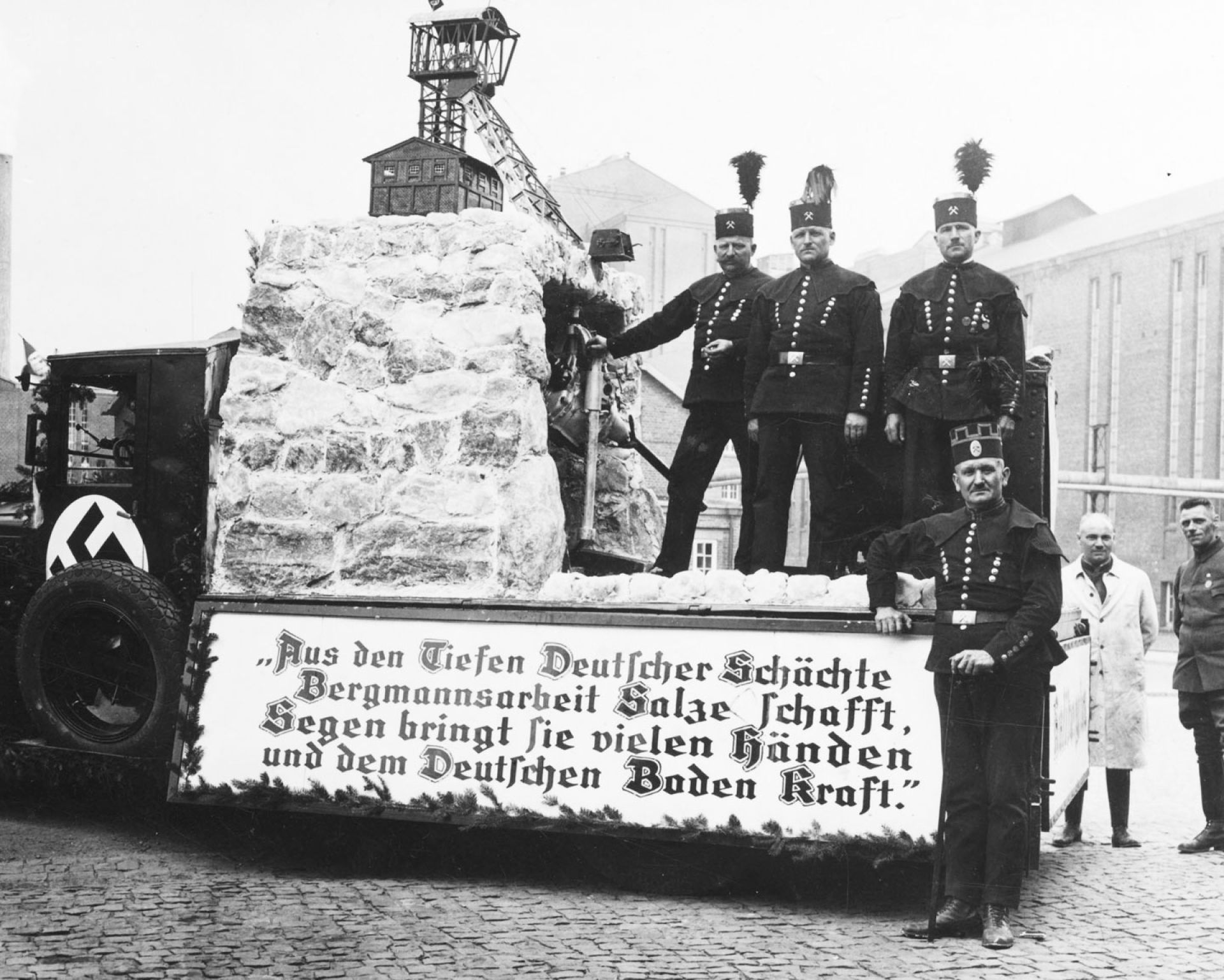

In 1938, Miners from the Merkers potash plant pose at a decorated float, which elevates potash production to a national task.
From Potash company to mayor player of the war economy
Dr Rainer Karlsch (Institute of Contemporary History Munich/Berlin) explored how the Wintershall potash company expanded its business activities to include the oil sector and participated in the "economy of destruction" in National Socialist Germany. He traced how the company placed itself entirely at the service of the war economy.
The involvement of the board members
The management of Wintershall AG was the key focus of Adjunct Prof. Dr Ingo Koehler’s conference presentation: He showed how early Wintershall General Director August Rosterg supported the National Socialists out of opportunistic motives, became deeply involved in the structures of robbery and persecution and made good business by exploiting predicaments.


Historical drawing of Wintershall's Managing Director August Rosterg (1870-1945), no date.
The results of this study are painful: our company used forced labourers and participated in the Nazi war economy. We are learning from this: As a company with a long tradition, we not only want to come to terms with our responsibility historically, but also take responsibility in the here and now - for a strong, democratic society."
Our responsibility remains, research continues
The scientific results of “Expansion at all costs” not only contribute to the reappraisal of Wintershall’s history under National Socialism, but also allow closer scrutiny of the behaviour of the entire oil and gas industry during the Nazi period, serving as a reminder today that economic action is always political action. As a consequence we also put the history of our second predecessor company under scrutiny: the history of DEA between 1933 and 1945.
DEA in the time of National Socialism
Unlike Wintershall, there were already a few individual publications on certain aspects of DEA’s history during the Nazi era: Rainer Karlsch included parts of it in his industry study “Faktor Öl: Die Mineralölwirtschaft in Deutschland 1859-1974” (The Factor Oil: The Mineral Oil industry in Germany from 1859 to 1974 (German Only)). He also published an essay on Karpaten Öl AG, a joint venture of German oil companies in which DEA had a significant stake in terms of finance and personnel. Karpaten Öl AG was to exploit the oil deposits in what is now Poland and used tens of thousands of forced labourers to do so.
Other historians provided insights into the fate of a number of Jewish DEA board members and supervisory board members in collective studies and source books: for example, Georg Solmssen, Chairman of the Management of Deutsche Bank AG and Chairman of the Supervisory Board of DEA, was forced out of office in 1938 due to his Jewish origin, as was DEA board member Fritz Haußmann.
Yet, we’re lacking a concise view on the whole history of DEA during the time of National Socialism. This is why Wintershall Dea has asked the Gesellschaft für Unternehmensgeschichte (“Business History Society”) to start a follow-up project. To this end, Prof Dr Manfred Grieger and Dr Rainer Karlsch have been researching archives across Europe and opening up new sources since February 2022. Wintershall Dea is making its own archive available without restriction. A book publication on the history of DEA during the National Socialist period will follow suit.
On 8 November 2023, Rainer Karlsch and Manfred Grieger presented new findings to the public for the first time at a historical conference in Hamburg. Scientists from other institutions also presented their research here, broadening the view of the German petroleum industry between 1933 and 1945. In the following, you will find abstracts of the presentations held at the symposium.


First findings on the history of DEA between 1933 and 1945 were presented at a historical conference in November 2023.
Video: Book presentation
In 2020, Wintershall Dea published studies on the company's role in the Nazi era. The book was presented in Kassel and followed by a panel discussion that focussed on the question of which responsibilities for the present result from our own past.
Video: Book presentation
In 2020, Wintershall Dea published studies on the company's role in the Nazi era. The book was presented in Kassel and followed by a panel discussion that focussed on the question of which responsibilities for the present result from our own past.
Below you will find abstracts of the presentations given at the historical conference of 2023.
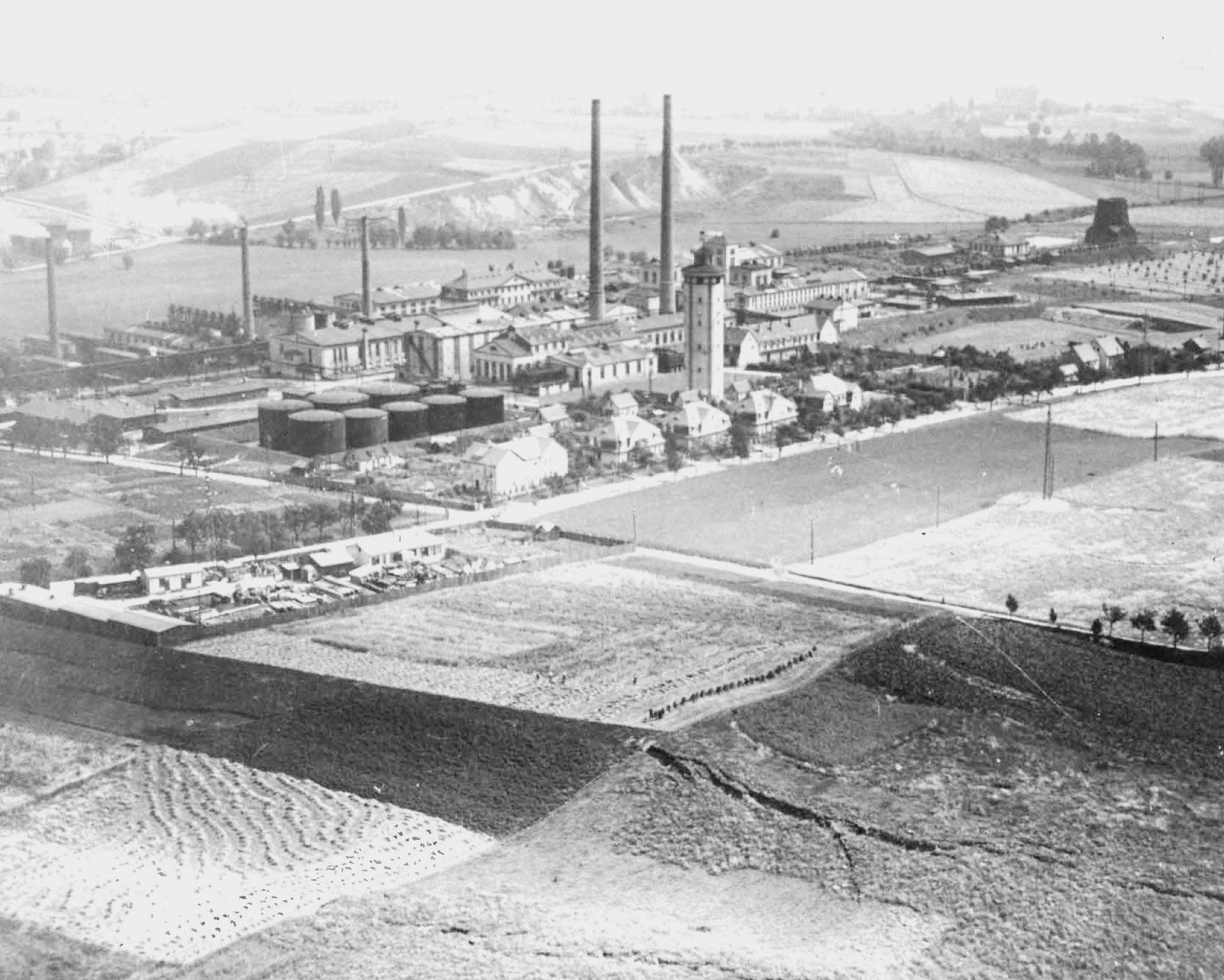

Aerial view of the DEA site in Rositz. The photo was taken around 1934.
The DEA site in Rositz
Prof Dr Manfred Grieger used the example of the DEA site in Rositz to show how the Nazi economic policy of expansion and war led to a significant increase in production capacity. More than 3200 forced labourers were deployed there to ensure the production of heating oil and fuel for the navy.
The Annexation of Austria as an opportunity for DEA
In his presentation, Dr Rainer Karlsch explained DEA's activities in Austria after the annexation by the German Reich in 1938, which have hardly been researched to date. He showed how DEA's wartime economy also made it possible for DEA to return to the oil business.
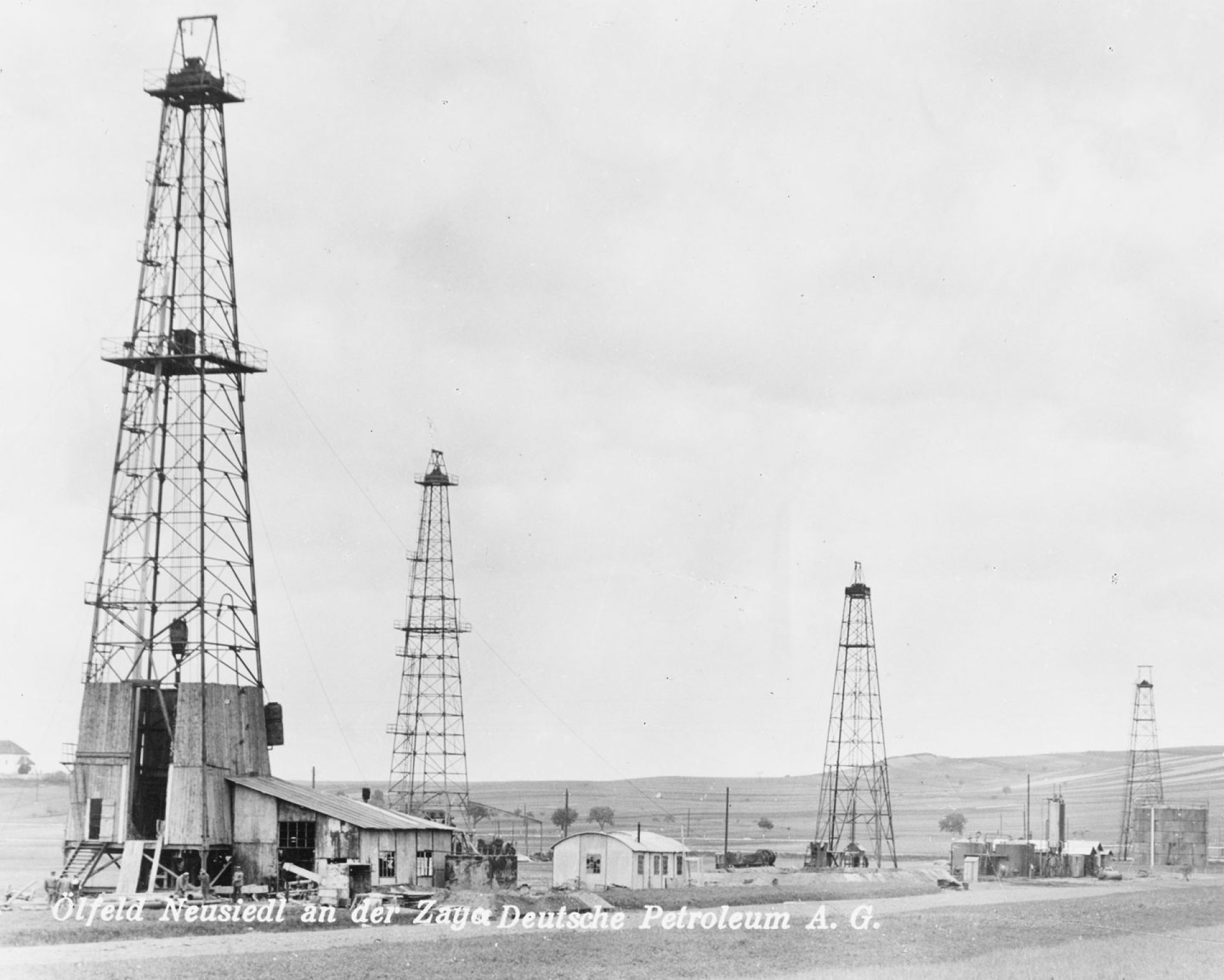

In 1938, DEA also entered the oil business in Austria through its subsidiary Deutsche Petroleum AG - for instance near Neusiedl an der Zaya.
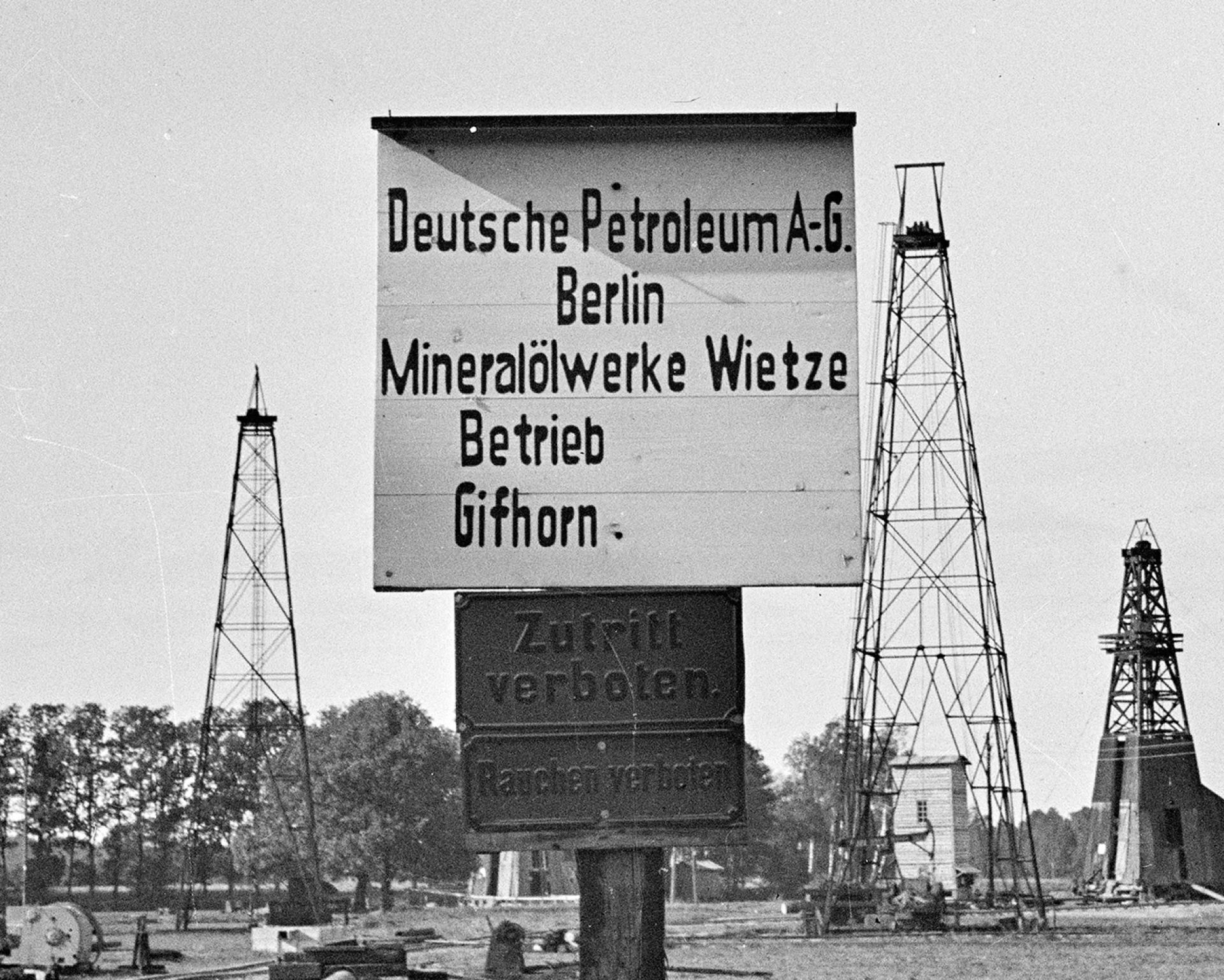

Oil exploration in the Gifhorn area in 1935 was co-financed by the Reich drilling programme.
Beneficiaries beyond 1945
The Nazi regime's Reich Drilling Programme caused a real boom in the search for crude oil in Germany. In his presentation, Marvin Brendel (All About Assets agency, for Wintershall Dea) explained how both DEA and Wintershall continued to benefit after the end of the war from the drilling programme and the legal situation, which had also been adapted by the National Socialists.
Close ties between business and politics
How closely did German politics and oil companies co-operate during the Nazi era? Dr Karsten Linne (Hamburg Foundation for the Promotion of Science and Culture) explored this question in his contribution using the example of the founding of Kontinentale Öl AG.
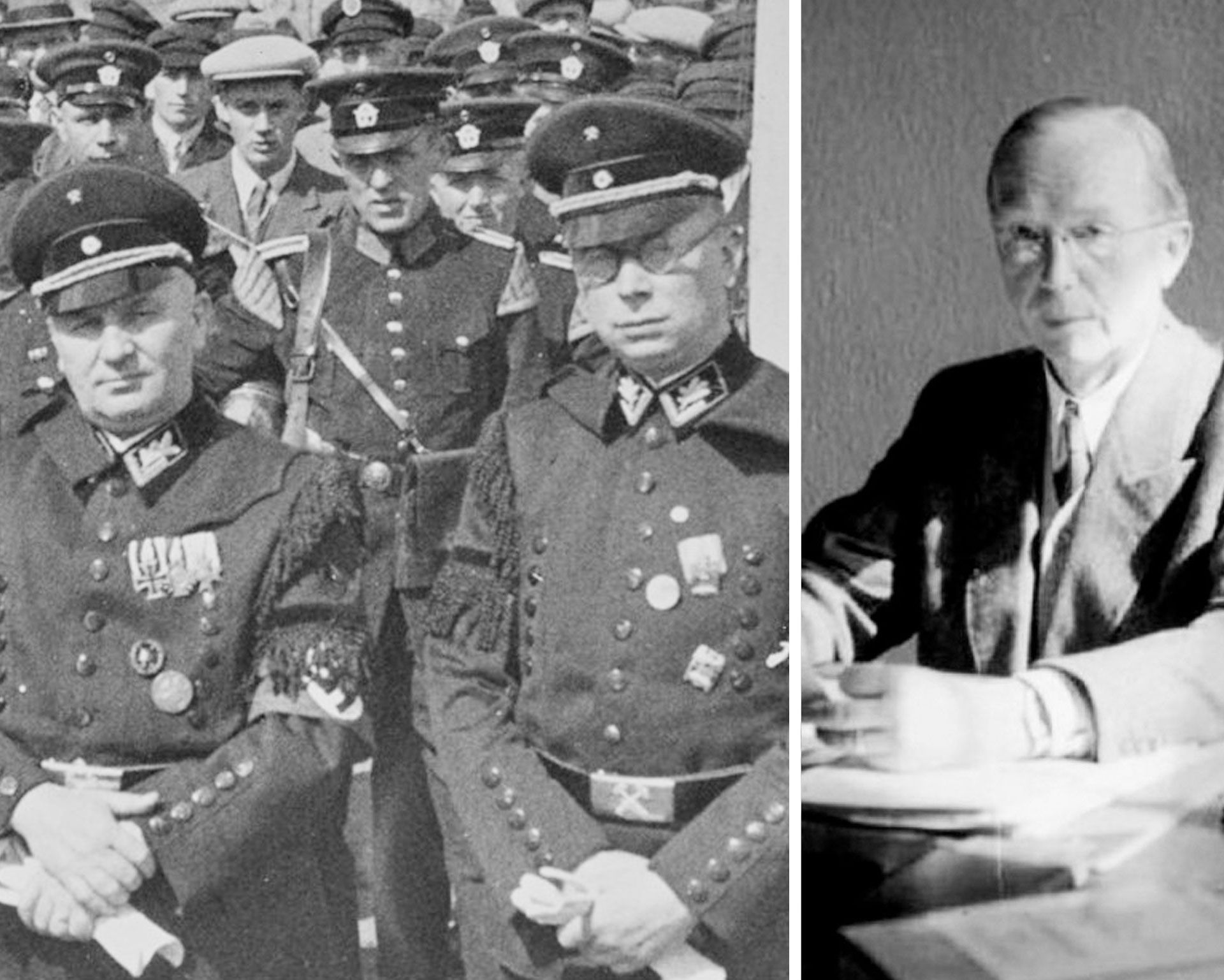

DEA managers as functionaries: Karl Große (l.) was head of Karpaten Öl AG, Günther Schlicht (centre) was part of the Technical Brigade for Mineral Oil. Karl Schirner (r.), was on the supervisory board of Kontinentale Öl AG.
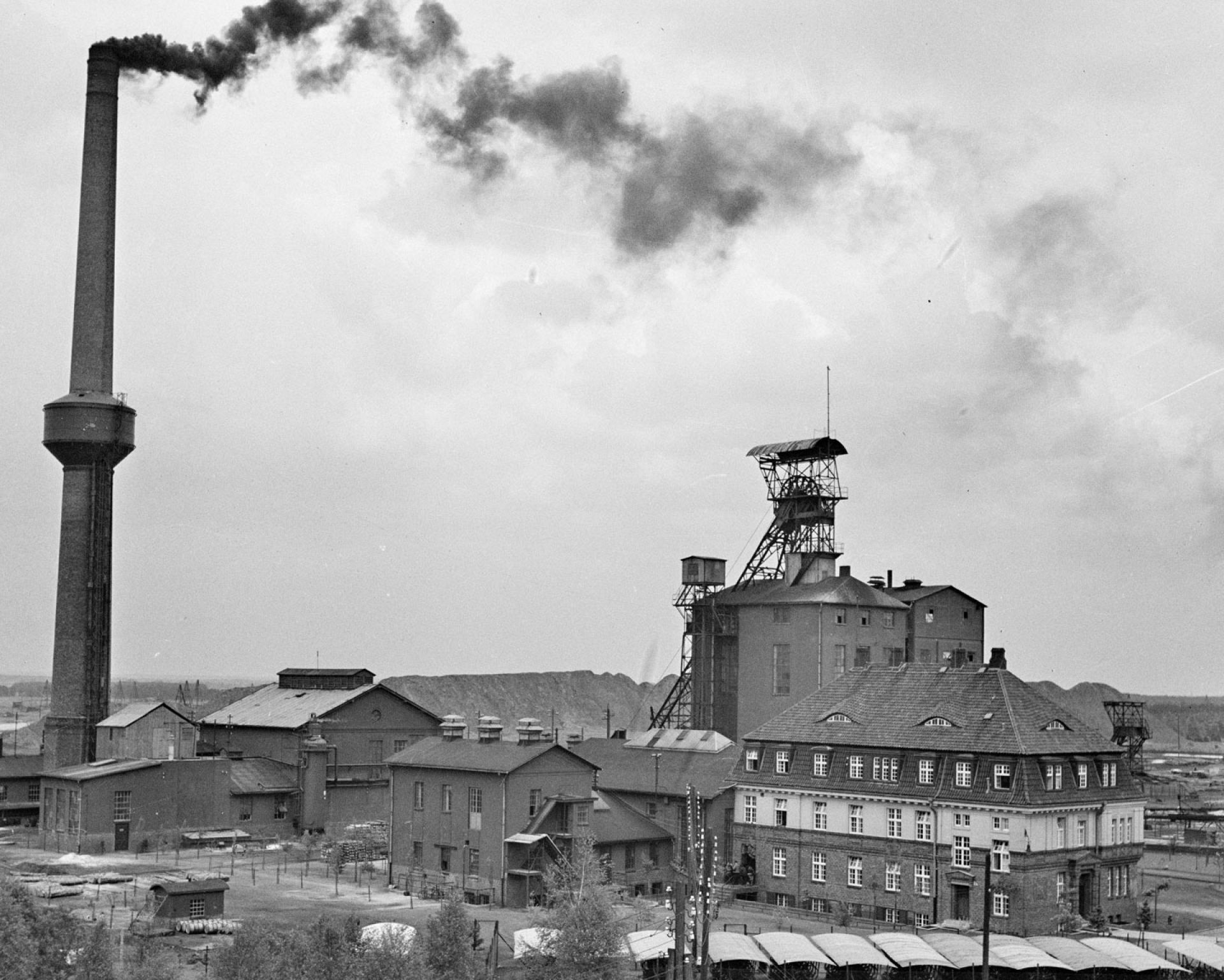

The shaft and central office at the DEA site in Wietze (Celle district) in 1938.
The Petroleum Industry in the district of Celle
A spotlight was shed on the district of Celle, one of the most important DEA locations by Dr Christian Hellwig, Dr Jana Stoklasa and Dr Rita Seidel (Institute for the Didactics of Democracy, Leibniz University of Hanover). They presented their research findings on the petroleum industry in Lower Saxony, focusing on topics such as the Nazi integration of the workforce, the use of forced labour and research and teaching on the subject of petroleum at Hanover University of Applied Sciences and Arts.
Book launch on the history of DEA during the period of National Socialism


The book „Fuelling the Second World War: Deutsche Erdöl AG, 1933-1945” was presented in November 2024 in a public book launch with talks and a discussion panel.
After three years, a long-standing research project has come to an end: Under the title "Fuel for the Second World War: The Deutsche Erdöl Aktiongesellschaft, 1933-1945", historians Prof Dr Manfred Grieger and Dr Rainer Karlsch presented their book for the history of DEA during the National Socialist period at the Hamburg site of Wintershall Dea in November 2024.
Their most important findings:
- Opportunism and a cool-headed pursuit of profit characterised the actions of Deutsche Erdöl Aktiengesellschaft (DEA) during the National Socialist era.
- The company began expanding its heating oil and diesel production for the navy as early as autumn 1933.
- DEA profited both from the "Aryanisation" of Jewish companies and from state armament programmes.
- After the "Anschluss" of Austria, DEA became the most important German oil company and participated in the exploitation of oil reserves in the occupied countries
- In all of this, the company management condoned the exploitation of forced labourers.
After their presentation Rainer Karlsch and Manfred Grieger discussed the reappraisal of the company’s history during the Nazi era and the responsibility of German business for today’s culture of remembrance together with Maria Wilke (Head of the EVZ Academy of the Foundation “Remembrance, Responsibility and Future”) and Professor Dr. Detlef Garbe (former Director of the Foundation of Hamburg Memorials and Learning Centres), under the moderation of the economic historian Professor Dr. Walter Iber (University of Graz).
Video: Book launch
In 2024, the authors Dr Rainer Karlsch and Prof Dr Manfred Grieger published their research on the history of DEA in a book. The book presentation followed by a panel discussion on the responsibility of businesses was recorded for interested parties.
Video: Book launch
In 2024, the authors Dr Rainer Karlsch and Prof Dr Manfred Grieger published their research on the history of DEA in a book. The book presentation followed by a panel discussion on the responsibility of businesses was recorded for interested parties.
DEA benefited from the policy of rearmament
In their book “Fueling the Second World War,” Rainer Karlsch and Manfred Grieger show in detail how strongly the former DEA profited from the Nazi war economy. Among other things, Deutsche Erdöl AG produced large quantities of synthetic fuel from lignite tar for the navy, whose large orders, together with government loans, played a vital part in enabling DEA to expand its locations in the central German lignite mining district.
The authors also demonstrated how, spearheaded by Hans Gröber from DEA’s Management Board, the company participated in the “Aryanisation” of Jewish businesses and how it dismissed the Jewish board member Fritz Haußmann and several Jewish Supervisory Board members up to 1938. Another key aspect of the study is the use of tens of thousands of forced labourers, who were exploited by DEA both in the German Reich and in the occupied territories and who made up more than a third of the workforce in 1944.


DEA board member Hans Gröber (left) enriched himself privately with the "Aryanisation" of Jewish department stores. His fellow board member Fritz Haußmann (right), on the other hand, had to leave the company in 1938 because of his Jewish origins.
Management took advantage during Nazi period
Wintershall Dea’s first reappraisal project has shown, for instance, that the management of the then Wintershall AG under General Director August Rosterg was closely entwined with the NSDAP party, and especially with Heinrich Himmler, the commander of the SS, and actively supported the National Socialists with donations, among other things.
The follow-up study on the history of DEA reveals that, compared to Wintershall, DEA’s management did not sympathise so openly with the National Socialists. However, neither did it oppose their policies, as Stefan Schnell, CEO of Wintershall Dea, emphasises. “The managers kept silent and opportunistically took advantage of the commercial opportunities that presented themselves,” says Schnell. Both predecessor companies had profited from business opportunities arising from the Nazis’ rearmament and war policy. For example, DEA received loans to develop new crude oil sources as part of the Reich Drilling Programme, from which the company continued to benefit even after the end of the Second World War.
“With the study on the role of DEA and its significance in producing fuel for the Second World War, the company is living up to its historical responsibility,” says Dr. Andrea H. Schneider-Braunberger, CEO of GUG. “Because its economic success was due not least to the use of forced labourers, as shown in the study with reference to individual locations.”


Two academic studies now provide information on the history of Wintershall Dea's predecessor companies during the Nazi era - in German and English respectively.
Both studies are available from bookstores
The detailed study “Fueling the Second World War. Deutsche Erdöl AG, 1933-1945” by Rainer Karlsch and Manfred Grieger has been published as a hardcover book (445 pages, ISBN 978-3-95542-526-5) in German and English by the publishing house Societäts-Verlag. It is available in bookstore and costs 20 euros.
The predecessor analysis “Expansion at All Costs – Studies on Wintershall AG between Crisis and War, 1929-1945” by Manfred Grieger, Rainer Karlsch and Ingo Köhler (hardcover, 258 pages, ISBN 978-3-95542-391-9) can still be obtained from regular bookstores.

